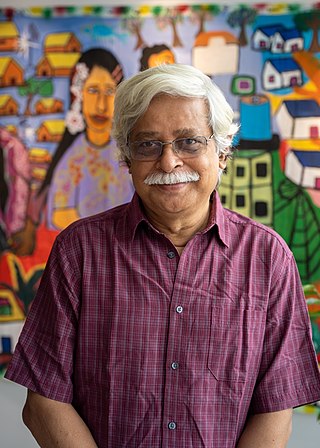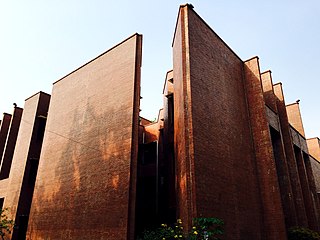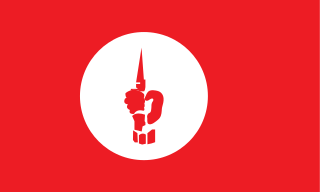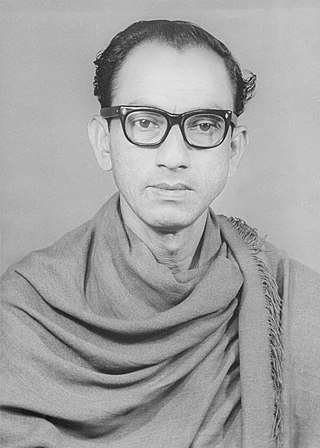
Sheikh Mujibur Rahman, popularly known by the honorific prefix Bangabandhu was a Bengali politician, revolutionary, statesman, activist and diarist, who served as the President of Bangladesh from April 1971 to January 1972 and again from January 1975 till his assassination in August 1975, and Prime Minister from January 1972 to January 1975. Mujib successfully led the Bangladeshi independence movement and restored the Bengali sovereignty after over two centuries following the Battle of Plassey in 1757, for which he is honoured as the 'Father of the Nation' in Bangladesh. In 2011, the fifteenth constitutional amendment in Bangladesh referred to Sheikh Mujib as the Father of the Nation who declared independence; these references were enshrined in the fifth, sixth, and seventh schedules of the constitution. His Bengali nationalist ideology, socio-political theories, and political doctrines are sometimes called Mujibism.

Barisal Division is one of the eight administrative divisions of Bangladesh. Located in the south-central part of the country, it has an area of 13,644.85 km2 (5,268.31 sq mi), and a population of 9,100,102 at the 2011 Census. It is the least populous Division within the entirety of Bangladesh. It is bounded by Dhaka Division on the north, the Bay of Bengal on the south, Chittagong Division on the east and Khulna Division on the west. The administrative capital, Barisal city, lies in the Padma River delta on an offshoot of the Arial Khan River. Barisal division is criss-crossed by numerous rivers that earned it the nickname Dhan-Nodi-Khal, Ei tin-e Borishal.

Muhammed Zafar Iqbal is a Bangladeshi science fiction author, physicist, academic, activist and former professor of computer science and engineering and former head of the department of Electrical and Electronic Engineering at Shahjalal University of Science and Technology (SUST). He achieved his PhD from University of Washington. After working 18 years as a scientist at California Institute of Technology and Bell Communications Research, he returned to Bangladesh and joined Shahjalal University of Science and Technology as a professor of Computer Science and Engineering. He retired from his teaching profession in October 2018. He is considered one of Bangladesh's top science fiction writers.

The Bangla Academy is an autonomous institution funded by the Bangladesh government that fosters the Bengali language, literature and culture, works to develop and implement national language policy and to do original research in the Bengali language. Established in 1955, it is located in Burdwan House in Ramna, Dhaka, within the grounds of the University of Dhaka and Suhrawardy Udyan. The Bangla Academy hosts the annual Ekushey Book Fair.

Dhaka College also known as DC is one of the most important as well as the earliest higher secondary educational institution of Bangladesh located in Dhanmondi, Dhaka. It offers higher secondary education (HSC). It has Honours and Master's programs as well which are affiliated with the University of Dhaka.
The Bangladesh Liberation War started on 26 March 1971 and ended on 16 December 1971. Some of the major events of the war are listed in the timeline below.

Ekushey Padak is the second highest civilian award in Bangladesh, introduced in memory of the martyrs of the Bengali Language Movement of 1952. The award is given to recognize contributions in a number of fields, including culture, education, and economics. The Ministry of Cultural Affairs administers the award.

The National Library of Bangladesh is the legal depository of all new books and other printed materials published in Bangladesh under the copyright law of Bangladesh. It was founded in 1973, but it traces its origins back to 1967, before the Bangladesh Liberation War and its independence. It is open to general public and has both Bengali and English language books. It is housed in the National Library Bhaban.

The independence of Bangladesh was declared on 26 March 1971, at the onset of the Bangladesh Liberation War by Bangabandhu Sheikh Mujibur Rahman; the following day the declaration was broadcast by Major Ziaur Rahman in a radio broadcast. On 10 April, the Provisional Government of Bangladesh issued a proclamation on the basis of the previous declaration and established an interim constitution for the independence movement.

1971 Dhaka University massacre refers to the massacre of students and faculty at the University of Dhaka in East Pakistan by the Pakistan Army, at the beginning of what would become the Bangladesh Liberation War. In March 1971, the Pakistan Army Eastern Wing Commander Tikka Khan launched Operation Searchlight on the orders of dictator Yahya Khan to crush the Bengali nationalist movement. As part of the operation, the army launched an assault on the university campus.

The Mukti Bahini, also known as the Bangladesh Forces, was the guerrilla resistance movement consisting of the Bangladeshi military, paramilitary and civilians during the Bangladesh Liberation War that transformed East Pakistan into Bangladesh in 1971. They were initially called the Mukti Fauj.
Avijit Roy was a Bangladeshi-American engineer, online activist, writer, and blogger known for creating and administrating the Mukto-Mona (Free-minded), an Internet blogging community for Bangladeshi freethinkers, rationalists, skeptics, atheists, and humanists. Roy was an advocate of free expression in Bangladesh, coordinating international protests against government censorship and imprisonment of atheist bloggers. He was hacked to death by machete-wielding assailants in Dhaka, Bangladesh, on 26 February 2015; Islamic militant organization Ansarullah Bangla Team claimed responsibility for the attack.

Muhiuddin Khan was an Islamic scholar from Bangladesh and editor of Monthly Madina. Khan was also a Quranic commentator, journalist, poet, writer and translator. He translated for the first time tafseer Maariful Quran into Bengali.
National Book Centre is a Bangladesh government centre under the Ministry of Cultural Affairs that is responsible for encouraging reading, organize book fairs, and support publishing of books in Bangladesh.
Mohiuddin Ahmed, also known by his daak naam Panna Mia, was a Bangladeshi politician. He was elected a member of parliament in 1973, 1979 and 1991. He was posthumously awarded with an Ekushey Padak in 2000.
Abu Zafar Mohammad Saleh, popularly known as the Pir of Sarsina, was a Bangladeshi Islamic scholar. He was said to have contributed to the establishment of 3000 educational institutions. Saleh had also pushed for the establishment of the Islamic Arabic University and ibtedayi madrasas in Bangladesh. Despite being a recipient of the Independence Day Award, he has been accused of collaborating with the Pakistan Army and committing war crimes during the Bangladesh Liberation war.
Mohiuddin Ahmed was a Bangladeshi diplomat, the first in Europe to join the Bangladesh Liberation War while he was a second secretary at the High Commission of Pakistan in London. During his career, he served in different positions at Bangladesh Missions in Delhi, Geneva, Jakarta, Jeddah, and New York, and as a Secretary in the Ministry of Foreign Affairs and Principal, Foreign Service Academy. In 1997, he declined two years' ante-dated seniority given to freedom fighter officers. He was also a columnist and has written about 1500 columns in mainstream dailies and weeklies in Bangladesh.
2021 (MMXXI) was a common year starting on Friday of the Gregorian calendar, the 2021st year of the Common Era (CE) and Anno Domini (AD) designations, the 21st year of the 3rd millennium and the 21st century, and the 2nd year of the 2020s decade.
Mohiuddin Ahmed was a Bangladeshi author, editor and publisher, and the founder of The University Press Limited.

Mosharraf Hossain was a politician and lawyer from Jessore, Bangladesh. He was actively involved in the Bengali nationalist movement in East Pakistan and the Liberation War of Bangladesh in 1971.











